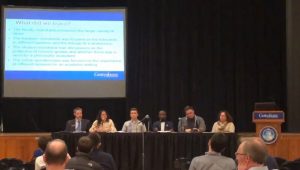Freedom of Expression Philosophy a Trojan Horse

Members of the Freedom of Expression Workgroup present at Thursday’s town hall (Screenshot captured from video by Jamie Welch / The Gettysburgian)
By Christian Lansinger, Guest Columnist
Although initially gathering a preponderance of support among the campus community, the college’s recently drafted Freedom of Expression Philosophy is beginning to encounter serious criticism about its true impact and intent. As the draft inches closer to a vote in the Student Senate, ordinarily silent individuals such as myself are coming to the realization that this draft does precisely the opposite of what it implies. That is, this draft, albeit well-intended, would actually infringe on the freedom of expression it claims to protect. It has been accurately labeled a “two-faced pretender,” its impact disguised in a maze of rhetoric. As a member of the campus community, not involved in the Student Senate and relatively inactive in discussions laden in politics, I am compelled to urge the Student Senate to reject this draft as a fraudulent protection of freedom of expression.
At first glance, the proposed Freedom of Expression Philosophy appears to unabashedly defend the values of freedom of expression and open inquiry. It supports this position by asserting that: “…freedom of expression allows us to continually strive to better society and address injustices”. It further posits: “Freedom of expression is invaluable to the institution because it brings together multiple opinions, allows them to coalesce and/or clash, and opens them to the community’s reflections, analyses, and critiques.” It even rejects the alternative of censorship: “It is not the role of the College to shield individuals from ideas and opinions they find unwelcome, disagreeable, uncivil, or even deeply offensive”. Finally, the draft summarizes its supposed position with an exceptional quote from Justice Brandeis: “If there be a time to expose through discussion the falsehood and fallacies, to avert the evil by the process of education, the remedy to be applied is more speech, not enforced silence.”
Upon further analysis, however, this draft dangerously encroaches on the same freedom of expression it insists it protects. Hidden within the extensive statements championing this freedom, the drafters inserted a small caveat deep within the document. After paragraphs of explaining “the limitless value of [students’] intellectual potential,” the draft then contradicts its own stance, listing “limited exceptions” that censor what student’s may or may not say. As is the case with federal law, there are indisputable limitations to freedom of expression, such as explicit threats of violence, or the idiom: “shouting ‘fire’ in an open theater.” But the draft goes further than these standards to encroach on freedom of expression, discreetly noting that the college may restrict expression that violates college policies on nondiscrimination. These seemingly insignificant exceptions within the three-page document open a door for the college administration for further encroachment.
Other op-eds have already discussed the ability of the college, under this philosophy, to censor vaguely-defined racial remarks or derogatory remarks towards ethnic food, as well as compel the use of certain language. But these limitations only impact you and me – today’s student body. When the college administration is put in charge of defining right and wrong, it opens a door for future censorship, future encroachment, and further curtailment of our freedom of expression. Today’s standards may seem trivial, but who is to tell what the standards will be five years from now? What about, twenty, or thirty years? What will the college deem right and wrong in the way we express ourselves and our views?
This past Friday, the college invited Xavier Harding, a previous alum, to speak to students as part of the college’s celebration of Black History Month. Written on the advertisement for the event were the following words: “The only thing better than a bright future is a black one.” I mention this advertisement not to condemn the statement, especially as a supporter of freedom of expression, but rather to illustrate the blurry line between what is considered acceptable language and what is considered discriminatory. Specifically, had the poster read, “The only thing better than a bright future is a white one,” should the responsible party then be punished for violating college policies on antidiscrimination? Adding on, does it matter who said these words, or in what context? In adopting this draft, we grant the school administration the authority to decide what is acceptable and what is not for the foreseeable future. We cannot trust the college administration to decide what language is on either side of this line, just as we cannot trust the government.
This philosophy empowers the college administration to encroach on our freedom of expression, the same freedom the draft describes as invaluable, helping to better society through clashing opinions. This freedom has been used in the past to correct our country’s historical, abhorrent injustices. By voting for this draft, we hinder our own ability to correct present and future injustices, and deter the betterment of society we all seek. In the remaining weeks before the vote, we must expose the draft for what it is – a trojan horse.
Realistically, we cannot control how the current and future government administrations choose to view freedom of expression. We face a current government administration that has suggested tightening the existing libel laws, as well as firing NFL players who express themselves in kneeling for the national anthem. But we do find ourselves in control of the college administration and its ability to encroach on our freedom of expression. If this Freedom of Expression Philosophy were to pass, future students would wonder in disbelief as to why we would so willingly relinquish our freedom to shield ourselves from particular viewpoints. In this defining moment in our school’s history, we have the chance to decide whether we open a door for the college to infringe on our ability to express ourselves freely and openly. As a nonmember, I urge the Student Senate to reject this fraudulent proposal.
–Christian Lansinger
